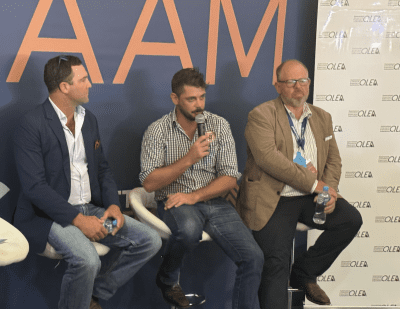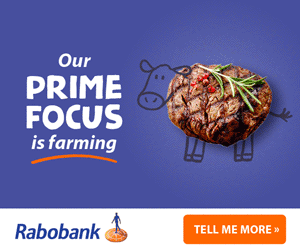The cattle export sector is enjoying its most optimistic trade outlook in years, but industry representatives are concerned about ongoing examples of lacking Federal Government support for the $1.3 billion sector.

Live export panel members Ryan Olive, Will Evans and Greg Pankhurst speaking at the AAM sit during Beef 2024.
It emerged at a live export industry panel session at Beef 2024 this week the Federal Government will not renew funding for a widely-lauded student exchange program that has brought more than 200 Indonesian students to northern Australian cattle properties over the past 10 years.
The program is a key initiative that has strengthened the important relationship between the two near neighbours and major trading partners.
Northern Territory Cattlemen’s Association CEO Will Evans said the NTCA program has been successfully running since late 2011, with more than 200 participants involved in the exchange initiative since that time.
“We bring Indonesian University students from 11 different universities across Indonesia to the Northern Territory, put them on cattle stations and they gain the experience and the insight that our stations were able to offer.
“We have an enormous alumni network in Indonesia.
“It is a program that has contributed enormous value to north Australia and the industries we all work in.
“And as of today , I am sitting here and telling you the Government is not going to fund it into the future.”
He said the Australian Government appeared to be shifting its mindset in Indonesia away from beef and toward mining and critical minerals.
“The frustration that we all have in this room is that we have been trading live cattle and beef with Indonesia since Indonesian was Indonesia.
“But today the Australian Government has shifted in a new direction, and they’re saying no we want to sell something else.
“Our trading partners are very concerned the Australian Government isn’t listening to Indonesia.”
A trade worth 50 million cattle in 30 years
Putting perspective around the size and scale of the trade, Queensland Livestock Exporters Association Greg Pankhurst noted that the equivalent of 50 million cattle have gone from Australia to Indonesia in the last 30 years in both live and boxed form – more than twice the size of the entire Australian cattle herd.
10 million had gone through the system since ESCAS animal welfare assurance system was put into place in 2011.
“What are we doing to make it another 50 million in the next 20 years?
“I really don’t think we’re doing much, especially (at) Government level.”
Mr Pankhurst also paid tribute to the well-trained but unsung Indonesian Animal Welfare Officers who facilitate the handling of Australian cattle once they arrive in Indonesia.
 “They’ve got around about 200 members (Animal Welfare Officers) at the moment, young people who are on the ground in Indonesia, they are in the abattoirs within Indonesia, they’re there every day and every night, and what are they doing? They are protecting Australia’s market.”
“They’ve got around about 200 members (Animal Welfare Officers) at the moment, young people who are on the ground in Indonesia, they are in the abattoirs within Indonesia, they’re there every day and every night, and what are they doing? They are protecting Australia’s market.”
He said there is currently an ESCAS review underway, which could lead to changes and potentially add more costs for producers and make the industry less competitive.
The panel raised concerns about the Federal Department of Agriculture’s decision to instruct vets to reject large numbers of northern cattle from shipments if they carried any skin blemishes or fly bites due to sensitivities around Lumpy Skin Disease in Indonesia.
“The Department was able to reject healthy cattle that completely fit the regulations and the expectations of what an animal needs to be to be exported,” Will Evans said.
“Because they changed their interpretation, they didn’t issue any sort of notice, they didn’t say this is what the new interpretation is, they just told their vets on the ground we want you to change the way that you’re allowing legal animals to be traded overseas, thousands and thousands head of livestock across northern Australia were just ineligible the export.
“No notice, no regulatory change, no disclosure.
“This is the danger we have, these powers are extraordinary, these are the powers that can be used to damage any one of us in the room, not just the live export industry.”
Asked about the spray at a press conference the following day, Minister King brushed it aside as not awkward.
“I get along really well with Tracey, and she’s a formidable advocate for beef in Australia, and she is a great Chair of the Northern Australia Infrastructure Facility.
“I was at the dinner, and I thought Tracey spoke really well, and I spoke to her after the dinner, and I think when people have a platform, especially at such an important event like beef, they should use that opportunity, and I think what she said and the manner in which Tracey said it was really respectful.
“This has lingered, there’s no doubt, and I’m not going to go into it again ’cause it’s an ongoing court case.”
She said it had lingered through “a couple of terms of the former government, and I know the Prime Minister, we want to resolve it”.
“There will always be differences of opinion on settlement payments and that can be distressing to those that are seeking, and I absolutely understand that.
“But, and Tracey’s right to raise those concerns, and if I feel a bit awkward about it, or Murray does, the Prime Minister does, well, that’s okay, that’s our job to listen to people, so that’s what we did.”
Optimistic outlook
Despite the concerns around lack of Government support, Mr Pankhurst said the supply and demand dynamics underpinning the trade this year were positive.
“I have great optimism about the trade at the moment.
“Indonesia is healthy again, we have a new Government coming in again now, the economy is improving, the feedlots are ready to go.
“The prices work for the trade at the moment, so I have got a lot of optimism for Indonesia.”

Another relevant marketing and biosecurity concern is that this current Gov’t has not acted on implementing the proposed National Livestock Genebank.
The CSRIO has done the proposal work, and the report is just sitting somewhere.
The diversity of Australian livestock genetics is important to help give choice for future generations in ever increasing times.
Live export of cattle is absolutely vital for the well being of all producers in Australia.
Why exactly is it that beef prices in Australia are still so depressed.? Is it solely there is not enough processing capacity in Australia and you can simply not just snap your fingers and start up new facilities.
With out live export all those cattle would simply shift south. Clogging up northern Australia facilities, which then has a run on effect of the facilities, no longer needing to look south to fill supply, so southern facilities in a domino effect all become clogged.
All these “niche” producers who think live export has nothing to do with them and they are safe from competition, price is king and with the economic outlook in Australia not looking that great, consumers will eventually slow down paying for well marketed over priced product and buy cheaper generic.
We only have to go back to what happened after the Labor government live export ban to see what that did to prices producers were getting all over Australia. That event and a large drought forced Australian prices down to poverty levels while world beef prices were booming.
Will Evans is absolutely right that the Federal Labor government has shifted in a new direction. It started some time ago, and at that time I sent the following message to a few of our elected representatives, whom I hope will have taken note.
“The recent meeting of the Federal and State Ministers responsible for agriculture, convened for the purpose of the “renewal” of the Australian Animal Welfare Strategy (AAWS), should send shivers down the spine of every livestock farmer in Australia, not to mention those in supporting industries and rurally supportive political parties. Presumably the Labor government wants the public to believe that errors and omissions in the existing animal welfare rules are so vast that they do not require any mention, because curiously there are no such mentions. Together with sympathetic stakeholders, the Labor government will develop during 2024 the “National Strategy on Animal Welfare” (NSAW). Again presumably, the draft strategy will then be open for extended comment and consultation, because the planned final release is not until 2027. Only a cynic would suggest the timing is to avoid a battle which Labor does not want to have before the next election!!! Such a timeline of course betrays the severity of what the socialist left of Labor would be demanding be included in the NSAW, and the live cattle export trade is what immediately comes to mind. The hype associated with the need for the “renewal” is greater market access, the capacity to maintain trade wins, the maturing of Australia’s approach to animal welfare, and the capacity to respond and adapt to challenges, opportunities, and science. Such public sector speak is worthy of a Sir Humphrey Appleby award. It behoves the Opposition to expose this “renewal” process for the sham that it is, and to continue to do so whilst ever Labor remains in government, because we can all bet our houses that this NSAW is intended be Labor’s instrument for shutting down the live cattle trade.”
Settling the live export class action is long overdue, however getting that done is the lesser challenge facing the live export industry. Being alert to the covert inherent danger within the NSAW process, and adopting a strategy to counteract it, is the critical challenge.
If the class action is successful, and I personally hope it is. Will Australian tax payers money be used to compensate large corporate businesses that are owned by overseas investors or companies?
Please if successful can the court rule that compensation is for Australian businesses. In my opinion overseas businesses can manage without our funds.
Same goes for the legal fees, lawyers and peak bodies involved in this matter. Tax payers should not be coughing up money to pay their expenses and fees.